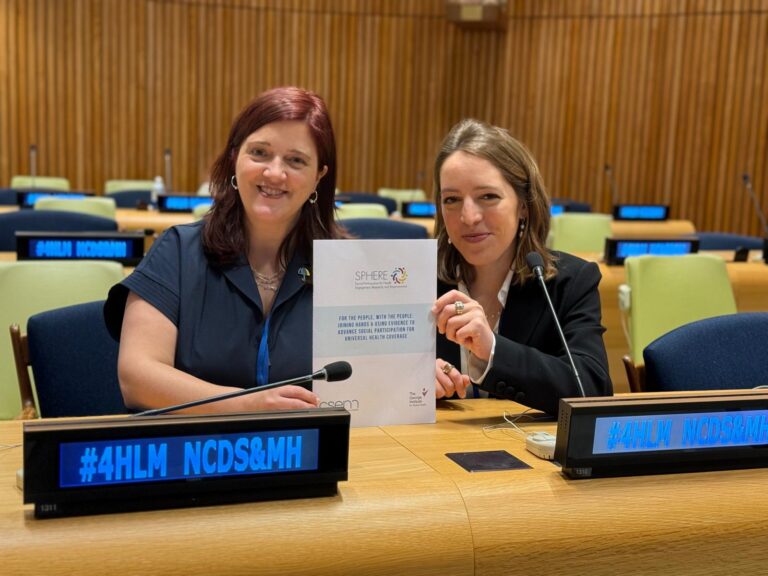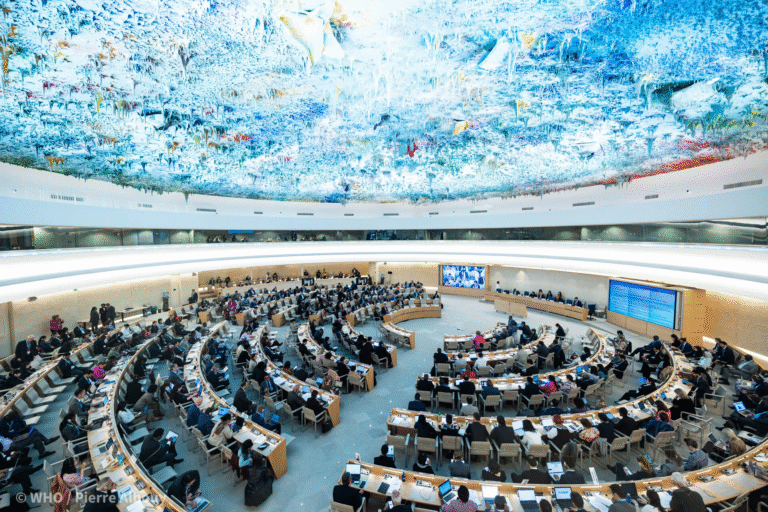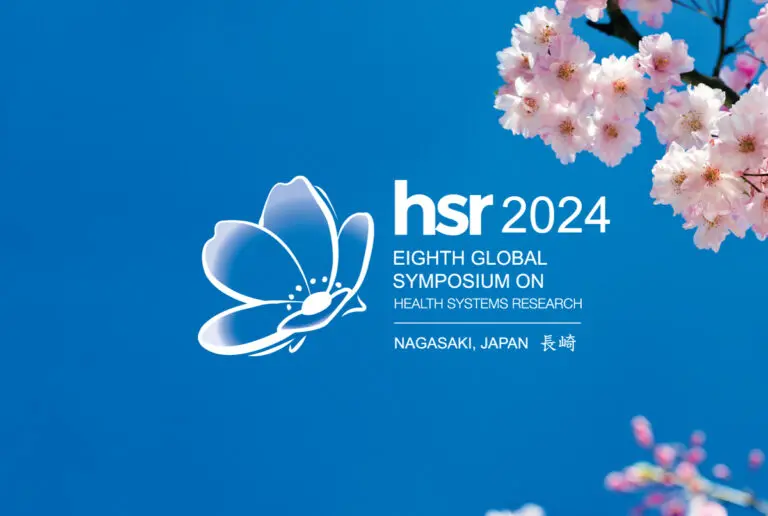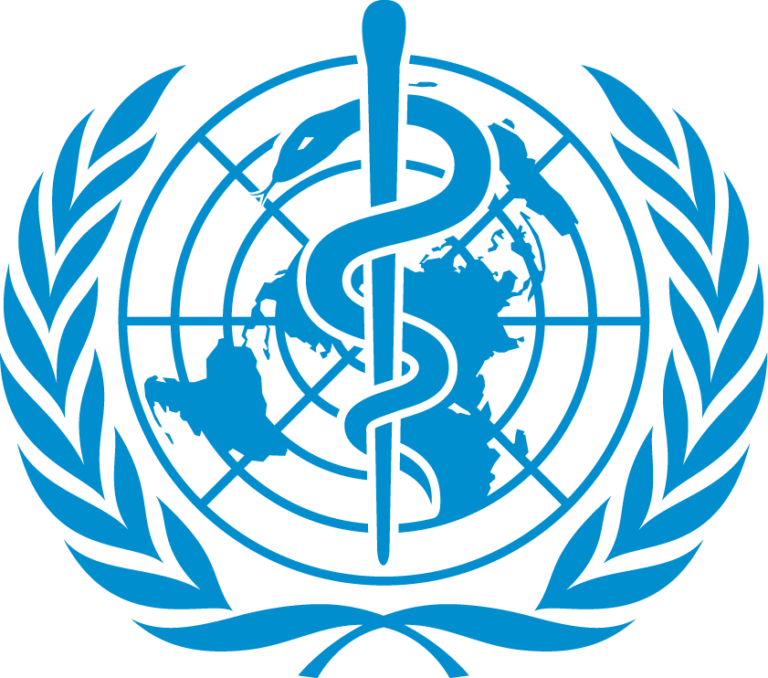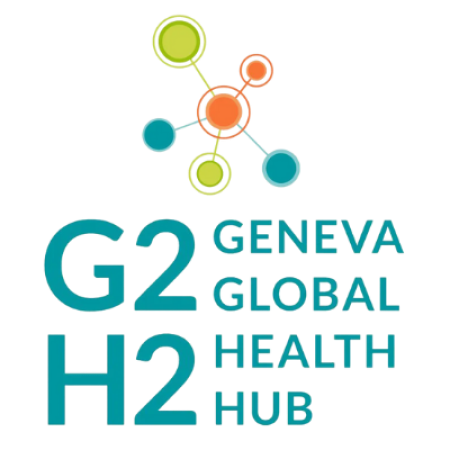Social participation mechanisms, the empowerment of people, communities, and civil society to participate in – and thereby influence- decision making process for health are vital for responsive health reforms that leave no one behind in efforts to achieve universal health coverage (UHC). In keeping with the theme of UHC Day 2023, the SPHERE consortium reiterates that the time to act is now. As a global community, we must unite to advocate for social participation as a key inclusive governance strategy for responsive government actions in pursuit of Health for All.
As 2023 comes to a close, it is important to reflect on the significance of advancing social participation for Universal Health Coverage (UHC). Social participation relates to the empowerment of people, communities and civil society to participate in – and thereby influence – decision-making processes for health. It is the cornerstone of equitable, inclusive, transparent, and responsive health systems that leave no one behind. Yet, in many parts of the world today, the avenues for social participation are diminishing and widening disparities as some governments increasingly target civil society and certain communities experiencing marginalisation, including gender minorities, women and girls and migrants.
However,in 2023 significant strides we also made in fostering the political momentum for advancing social participation. Social participation for health was a key theme of discussion at the United Nations High-Level Meeting (UN HLM) on UHC in September 2023. This resulted in strong commitments in the outcome political declaration that outlines key national actions and investments to accelerate progress towards UHC by 2030. A pivotal player in this achievement was the advocacy efforts of civil society both leading up to and during the HLM. Notably, social participation was identified as one of the priority action areas for governments in the Action Agenda collaboratively developed with civil society through consultations led by the multi-stakeholder Task Force under UHC2030 ahead of the UHC HLM.
In the declaration, world leaders committed to:
“Promote participatory, inclusive approaches to health governance for universal health coverage, including by exploring modalities for enhancing a meaningful whole-of-society approach and social participation, involving all relevant stakeholders, including local communities, health workers and care workers in the health sector, volunteers, civil society organisations and youth in the design, implementation and review of universal health coverage, to systematically inform decisions that affect public health, so that policies, programmes and plans better respond to individual and community health needs, while fostering trust in health systems”
– United Nations Political Declaration on Universal Health Coverage, 2023
During the 76th World Health Assembly, a group of countries led by Thailand and Slovenia also expressed their intention to pursue a resolution on Institutionalising Social Participation for Health and Well-being to be endorsed by Member States (MS) at the 77th World Health Assembly (WHA). If it is successful, the resolution will commit MS to accelerate actions toward strengthening and institutionalising social participation in health in their countries and to monitor progress. It will also serve as a basis and critical tool for civil society to hold governments accountable.
At the regional level, the WHO South-East Asia Regional Committee’s Delhi Declaration of November 2023 affirms that Member States in the region will “institutionalise social participation by creating mechanisms, structure, space, platforms and capacities for enhancement of community engagement in agenda setting, policy formulation, design of implementation and monitoring, and active involvement in primary health care service delivery” which is a positive advancement.
As part of the broader effort to mainstream social participation, a group of stakeholders led by the WHO, The George Institute for Global Health, and Management Science for Health came together under the SPHERE Consortium, a partnership between civil society, academic, and health organisations advancing research on, distilling lessons from, and strengthening social participation processes with a focus on UHC.The project is currently being implemented with collaborators in Kenya, Argentina, and Vietnam. In addition, the group has played an active role in mobilising civil society and building momentum for the resolution on social participation, including providing critical civil society input into ongoing negotiations. By learning from past experiences, the aim is to empower communities experiencing marginalisation and ensure their voices are heard in global health discourse, aligning with the UHC 2030 Action Agenda. We cannot do this alone.
The time to act is now: opportunities for getting involved in 2024.
Looking ahead to 2024, it is important to sustain and strengthen the momentum generated this year. The first order of business is to keep pressure on governments to implement the 2023 UHC political declaration, particularly the commitments on social participation at all levels.Civil society needs to be prepared to old leaders accountable for their promises.Collaboration with MS and other stakeholders is key to secure a successful World Health Assembly (WHA) resolution on social participation.Once more, the true challenge will be transforming these commitments into tangible actions once the resolution gets approved.
National-level political leadership holds immense significance in effecting change.By identifying contacts within Ministries of Health and engaging with delegations participating in WHO meetings to emphasise the importance of social participation, we can garner their support for endorsing the resolution. In 2024, SPHERE will launch an update of this advocacy brief titled ‘Advancing Social Participation for Universal Health Coverage’ to assist in these endevours.
The run-up to the end of the Sustainable Development Goals is fast approaching – if we are to truly make progress towards these global goals, and indeed to come together for a common vision of societal development, justice and progress thereafter, social participation is a necessary means and end.
Further reading:
- Read the CSEM advocacy brief which provides background information, key advocacy asks and identifies milestones in the lead up to the 77th World Health Assembly taking place in May 2024.
- Watch CSEM’s UHC Day online event – “From Commitment to Accountability: Tracking Commitments to Accelerate Progress for Universal Health Coverage”, available on-demand here.
- Watch the UHC Day webinar organised by the World Health Organization South-East Asia Region, “UHC – Now More Than Ever,” recording available here.
- Join CSEM to receive information and opportunities to engage in getting progress on UHC back on track and achieve health for all.
- Join the NCD Alliance ‘Walking the Talk towards greater involvement of people living with NCDs’ event on Thursday 14th December from 14:00-15:30 CET.
